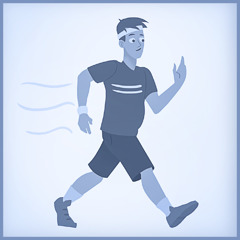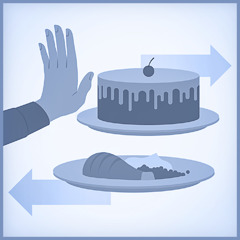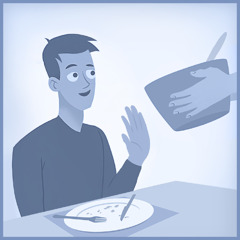Do I really need to lose weight?
Some teenagers say that they want to lose weight. However . . .
Many are more concerned about their appearance than their health. To shed pounds, some resort to quick fixes, like skipping meals or taking weight-loss pills. Such methods usually prove futile and are sometimes even dangerous.
“Some girls starve themselves to get faster results. This usually backfires, and then it takes a long time for their body to recover from the damage.”—Hailey.
Many who are concerned about their weight should not be. Their weight is fine—but perhaps they feel fat when they compare themselves with their peers or with the skinny “ideal” that the media promotes.
“When I was 13, I compared myself to my friends. I thought they would like me more if I looked like them—which meant that I had to be stick-thin.”—Paola.
On the other hand, some young people really do need to lose weight. According to a World Health Organization report . . .
Globally, some 340 million youths between the ages of 5 and 19 are overweight.
In 1975 just 4 percent of those in the 5-19 age bracket were overweight. By 2016 the figure had risen to 18 percent.
For most lands around the world, it is more common for people to be obese than to be underweight.
Obesity is also common in low-income countries, even in households where some members are undernourished.
What’s the best way to lose weight?
Which method would you choose?
Skip meals.
Combine exercise with a balanced diet.
Take weight-loss pills.
Correct answer: Method 2: Combine exercise with a balanced diet.
Skipping meals or cutting out a food group might get quick results. But those methods may not be healthy, and you’ll likely regain the weight once you return to your usual eating habits.
On the other hand, if you make it your goal to be healthy, you will look and feel your best. “The safest, healthiest, and most long-lasting results come from . . . altering your lifestyle in ways that you can maintain for the rest of your days,” writes Dr. Michael Bradley. * The point? If you need to lose weight, don’t think in terms of following a diet but of adopting a lifestyle change.
Action plan
The Bible tells us to be “moderate in habits”—and that includes eating habits. (1 Timothy 3:11) It even specifically says to avoid overeating. (Proverbs 23:20; Luke 21:34) With those principles in mind, try the following in order to adopt a healthier lifestyle:
Learn what healthy eating involves.
You don’t have to become a fanatic, but a little knowledge about nutrition can go a long way in helping you to have a balanced diet. And a balanced diet is one of the best ways to keep your weight on track.
Exercise regularly.
Think of everyday things you can do to keep active. For example, instead of taking the elevator, take the stairs. Trade a half hour of video gaming for a brisk walk outdoors.
Replace junk food with healthy choices.
“I try to keep healthy snacks like fruits and vegetables around,” says a teenager named Sophia. “That way I’m not tempted to eat a lot of nonnutritious food.”
Eat slowly.
Some people eat so fast that they don’t “hear” the body’s signal to stop! So slow down. Take a break before going for more food. You might find that you’re not as hungry as you think you are.
Monitor your intake of calories.
Read nutrition labels to see how many calories are in your food. Clue: Sweetened soft drinks, fast food, and desserts can be a major source of calories—and weight gain.
Be balanced.
Sara, 16, says: “At one point I was so obsessed with counting calories that when I looked at a plate of food, all I could see were numbers!” Don’t become a “calorie accountant.” You can allow yourself an occasional treat.
Tip: Talk to your doctor about your weight concerns. He or she can take your medical profile into consideration and help you adopt a lifestyle program that may work for you.






Comments